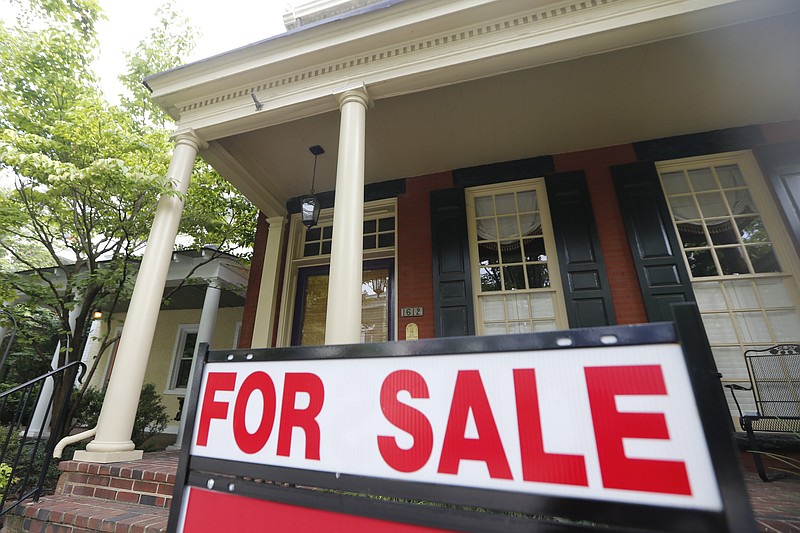WASHINGTON -- Average rates on long-term mortgages rose this week for the first time since June 25, after weeks of marking new record lows.
Mortgage buyer Freddie Mac reported Thursday that the average rate on the key 30-year home loan increased to 3.01% from 2.98% last week -- the first time in 50 years that it slipped below 3%. The rate averaged 3.75% a year ago.
Home buying demand continues to rebound despite the stagnant recovery and economic indicators pointing to slow growth and possible persistent high unemployment, Freddie Mac said.
The average rate on the 15-year fixed-rate mortgage rose to 2.54% from 2.48% last week. It was 3.18% a year ago. The five-year adjustable-rate average grew to 3.09% with an average 0.3 point. It was 3.06% a week ago and 3.47% a year ago.
[CORONAVIRUS: Click here for our complete coverage » arkansasonline.com/coronavirus]
In the latest evidence of deepening economic pain, the coronavirus pandemic's resurgence in large parts of the Sun Belt and across the country pushed up the number of Americans seeking unemployment benefits, the first increase in nearly four months, the government reported Thursday.
The resurgence of confirmed cases of the virus has forced some businesses to close a second time or to impose tighter restrictions on customers in response to state mandates. The resulting pullback in economic activity has hindered job growth and likely forced additional layoffs.
Freddie Mac, the federally chartered mortgage investor, aggregates rates from about 80 lenders across the country to come up with weekly national average mortgage rates. It uses rates for high-quality borrowers who tend to have strong credit scores and large down payments. These rates are not available to every borrower.
Despite the uptick, rates remain near historic lows.
"Rates have been remarkably flat lately, holding at or near record-low levels for essentially the entire month of July," said Matthew Speakman, a Zillow economist. "The reason for this is, of course, recent developments with the coronavirus pandemic. Investors continue to hold pat, waiting for clearer signs of damage to the economy as a result of the recent surge in cases, or evidence of society's resilience and ability to maintain some form of normalcy."
The low rates have spurred the housing market, one of the bright spots in the U.S. economy.
"The drop in rates is absolutely good news for anyone who wants to buy a home, as it increases the buyer's purchasing power," said Brian Koss, executive vice president of Mortgage Network. "On the flip side, low rates create increased demand for housing, which could potentially drive up prices. It really depends on what's happening in the borrower's local market."
Enticed by low rates, buyers returned in force last month. Existing-home sales rocketed up nearly 21% in June, the highest monthly gain on record. But even with the strong rebound from sharp declines in the previous months because of coronavirus shutdowns, sales were still down more than 11% annually.
"Existing-home sales are the latest major metric to climb out of the loss column, as reopenings in May and June boosted contract signings that resulted in strong June sales numbers," said Robert Frick, corporate economist at Navy Federal Credit Union. "It's progress, but the annualized number reported [Wednesday] for June is still far below the actual 5.34 million sold in 2019. Sales are still hampered by the weak economy, which causes fewer Americans to move for jobs and so keeps the supply of existing homes on the market low, as well as the potential buyers' reluctance to tour homes due to covid-19."
Not every borrower can take advantage of the low rates.
"Borrowers need to show they are a safe credit risk and have the ability to make their payments," Koss said. "Because lenders face an increased risk of borrowers requesting forbearance due to the economy, those with poor credit, high debt and inconsistent income will have a harder time getting qualified."
Bankrate.com, which puts out a weekly mortgage rate trend index, found half the experts it surveyed expect rates to remain about the same in the coming week.
"Many mortgage lenders are suffering from mortgage fatigue," said Jeff Lazerson, president of MortgageGrader in Laguna Niguel, Calif. "If they can't handle the mortgage loan volume as it is right now, there is zero motivation to drop rates further."
Information for this article was contributed by staff members of The Associated Press and by Kathy Orton of The Washington Post.
